Deakin University HPS307 AT1 Lab Report: PSU, EI, and Personality
VerifiedAdded on 2022/09/01
|19
|3376
|48
Report
AI Summary
This lab report, submitted by a student at Deakin University for the HPS307 course, investigates the relationship between problematic smartphone use (PSU) and emotional intelligence (EI), as well as its connection to personality traits. The study involved 1443 students who completed surveys measuring PSU and trait emotional intelligence (TEI). The research aims to determine if a correlation exists between these variables, addressing the gap in previous research. The report provides an overview of smartphone usage trends, including the prevalence of smartphone ownership and usage patterns in Australia, and discusses the potential negative impacts of excessive smartphone use on various aspects of life, including social relationships, emotional well-being, and academic performance. The study used the TEI Questionnaire-Short Form and a modified Adolescent Pre-occupation with Screens Scale. Data analysis revealed a correlation between PSU and EI, highlighting the importance of understanding the psychological impacts of smartphone use. The report also discusses the limitations of the study and suggests areas for future research, such as examining PSU during infancy and early childhood and incorporating a wider scope sample to benefit the research. The findings underscore the need for further investigation into the role of personality in PSU and EI and its implications for human behavior.
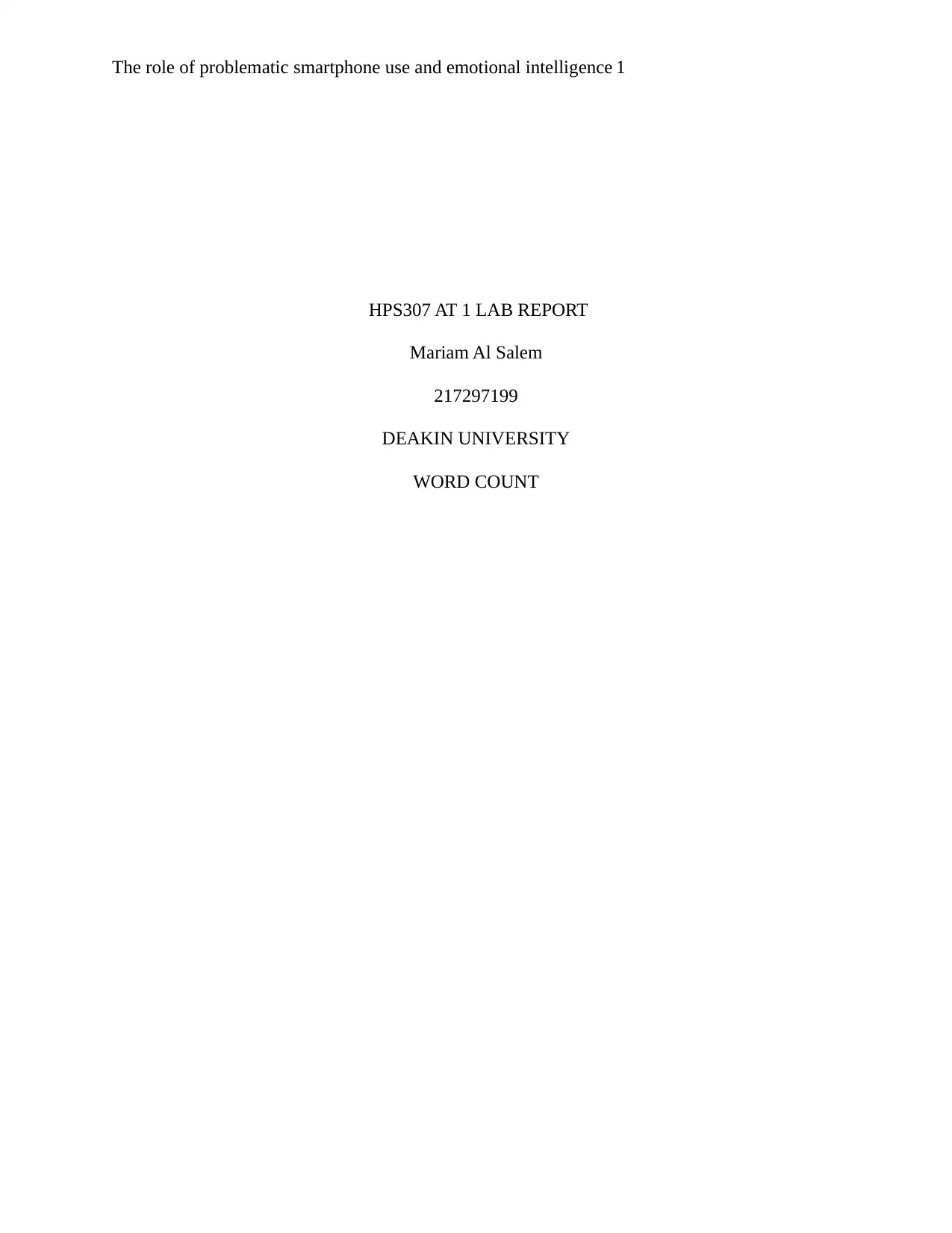
The role of problematic smartphone use and emotional intelligence 1
HPS307 AT 1 LAB REPORT
Mariam Al Salem
217297199
DEAKIN UNIVERSITY
WORD COUNT
HPS307 AT 1 LAB REPORT
Mariam Al Salem
217297199
DEAKIN UNIVERSITY
WORD COUNT
Paraphrase This Document
Need a fresh take? Get an instant paraphrase of this document with our AI Paraphraser
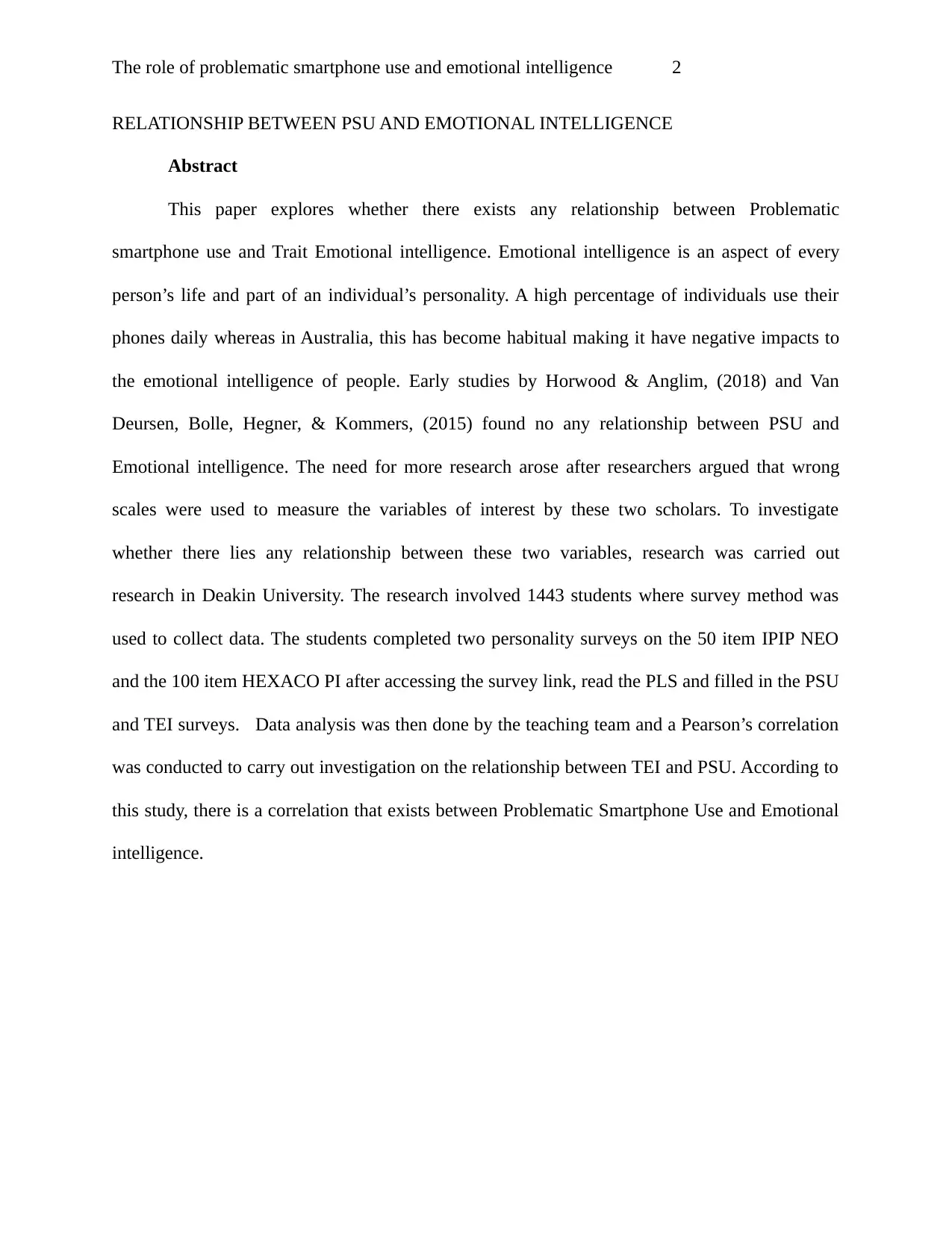
The role of problematic smartphone use and emotional intelligence 2
RELATIONSHIP BETWEEN PSU AND EMOTIONAL INTELLIGENCE
Abstract
This paper explores whether there exists any relationship between Problematic
smartphone use and Trait Emotional intelligence. Emotional intelligence is an aspect of every
person’s life and part of an individual’s personality. A high percentage of individuals use their
phones daily whereas in Australia, this has become habitual making it have negative impacts to
the emotional intelligence of people. Early studies by Horwood & Anglim, (2018) and Van
Deursen, Bolle, Hegner, & Kommers, (2015) found no any relationship between PSU and
Emotional intelligence. The need for more research arose after researchers argued that wrong
scales were used to measure the variables of interest by these two scholars. To investigate
whether there lies any relationship between these two variables, research was carried out
research in Deakin University. The research involved 1443 students where survey method was
used to collect data. The students completed two personality surveys on the 50 item IPIP NEO
and the 100 item HEXACO PI after accessing the survey link, read the PLS and filled in the PSU
and TEI surveys. Data analysis was then done by the teaching team and a Pearson’s correlation
was conducted to carry out investigation on the relationship between TEI and PSU. According to
this study, there is a correlation that exists between Problematic Smartphone Use and Emotional
intelligence.
RELATIONSHIP BETWEEN PSU AND EMOTIONAL INTELLIGENCE
Abstract
This paper explores whether there exists any relationship between Problematic
smartphone use and Trait Emotional intelligence. Emotional intelligence is an aspect of every
person’s life and part of an individual’s personality. A high percentage of individuals use their
phones daily whereas in Australia, this has become habitual making it have negative impacts to
the emotional intelligence of people. Early studies by Horwood & Anglim, (2018) and Van
Deursen, Bolle, Hegner, & Kommers, (2015) found no any relationship between PSU and
Emotional intelligence. The need for more research arose after researchers argued that wrong
scales were used to measure the variables of interest by these two scholars. To investigate
whether there lies any relationship between these two variables, research was carried out
research in Deakin University. The research involved 1443 students where survey method was
used to collect data. The students completed two personality surveys on the 50 item IPIP NEO
and the 100 item HEXACO PI after accessing the survey link, read the PLS and filled in the PSU
and TEI surveys. Data analysis was then done by the teaching team and a Pearson’s correlation
was conducted to carry out investigation on the relationship between TEI and PSU. According to
this study, there is a correlation that exists between Problematic Smartphone Use and Emotional
intelligence.
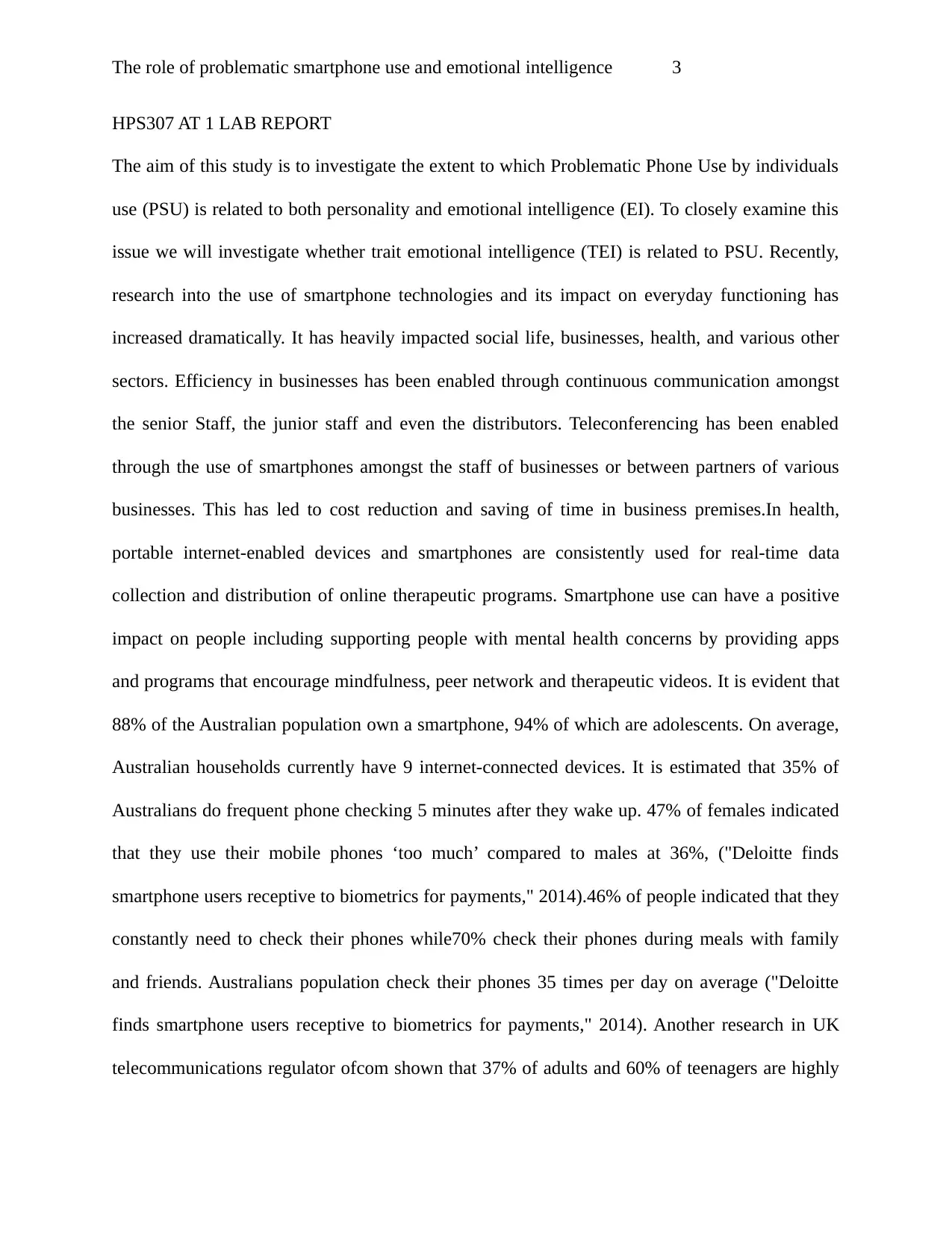
The role of problematic smartphone use and emotional intelligence 3
HPS307 AT 1 LAB REPORT
The aim of this study is to investigate the extent to which Problematic Phone Use by individuals
use (PSU) is related to both personality and emotional intelligence (EI). To closely examine this
issue we will investigate whether trait emotional intelligence (TEI) is related to PSU. Recently,
research into the use of smartphone technologies and its impact on everyday functioning has
increased dramatically. It has heavily impacted social life, businesses, health, and various other
sectors. Efficiency in businesses has been enabled through continuous communication amongst
the senior Staff, the junior staff and even the distributors. Teleconferencing has been enabled
through the use of smartphones amongst the staff of businesses or between partners of various
businesses. This has led to cost reduction and saving of time in business premises.In health,
portable internet-enabled devices and smartphones are consistently used for real-time data
collection and distribution of online therapeutic programs. Smartphone use can have a positive
impact on people including supporting people with mental health concerns by providing apps
and programs that encourage mindfulness, peer network and therapeutic videos. It is evident that
88% of the Australian population own a smartphone, 94% of which are adolescents. On average,
Australian households currently have 9 internet-connected devices. It is estimated that 35% of
Australians do frequent phone checking 5 minutes after they wake up. 47% of females indicated
that they use their mobile phones ‘too much’ compared to males at 36%, ("Deloitte finds
smartphone users receptive to biometrics for payments," 2014).46% of people indicated that they
constantly need to check their phones while70% check their phones during meals with family
and friends. Australians population check their phones 35 times per day on average ("Deloitte
finds smartphone users receptive to biometrics for payments," 2014). Another research in UK
telecommunications regulator ofcom shown that 37% of adults and 60% of teenagers are highly
HPS307 AT 1 LAB REPORT
The aim of this study is to investigate the extent to which Problematic Phone Use by individuals
use (PSU) is related to both personality and emotional intelligence (EI). To closely examine this
issue we will investigate whether trait emotional intelligence (TEI) is related to PSU. Recently,
research into the use of smartphone technologies and its impact on everyday functioning has
increased dramatically. It has heavily impacted social life, businesses, health, and various other
sectors. Efficiency in businesses has been enabled through continuous communication amongst
the senior Staff, the junior staff and even the distributors. Teleconferencing has been enabled
through the use of smartphones amongst the staff of businesses or between partners of various
businesses. This has led to cost reduction and saving of time in business premises.In health,
portable internet-enabled devices and smartphones are consistently used for real-time data
collection and distribution of online therapeutic programs. Smartphone use can have a positive
impact on people including supporting people with mental health concerns by providing apps
and programs that encourage mindfulness, peer network and therapeutic videos. It is evident that
88% of the Australian population own a smartphone, 94% of which are adolescents. On average,
Australian households currently have 9 internet-connected devices. It is estimated that 35% of
Australians do frequent phone checking 5 minutes after they wake up. 47% of females indicated
that they use their mobile phones ‘too much’ compared to males at 36%, ("Deloitte finds
smartphone users receptive to biometrics for payments," 2014).46% of people indicated that they
constantly need to check their phones while70% check their phones during meals with family
and friends. Australians population check their phones 35 times per day on average ("Deloitte
finds smartphone users receptive to biometrics for payments," 2014). Another research in UK
telecommunications regulator ofcom shown that 37% of adults and 60% of teenagers are highly
⊘ This is a preview!⊘
Do you want full access?
Subscribe today to unlock all pages.

Trusted by 1+ million students worldwide
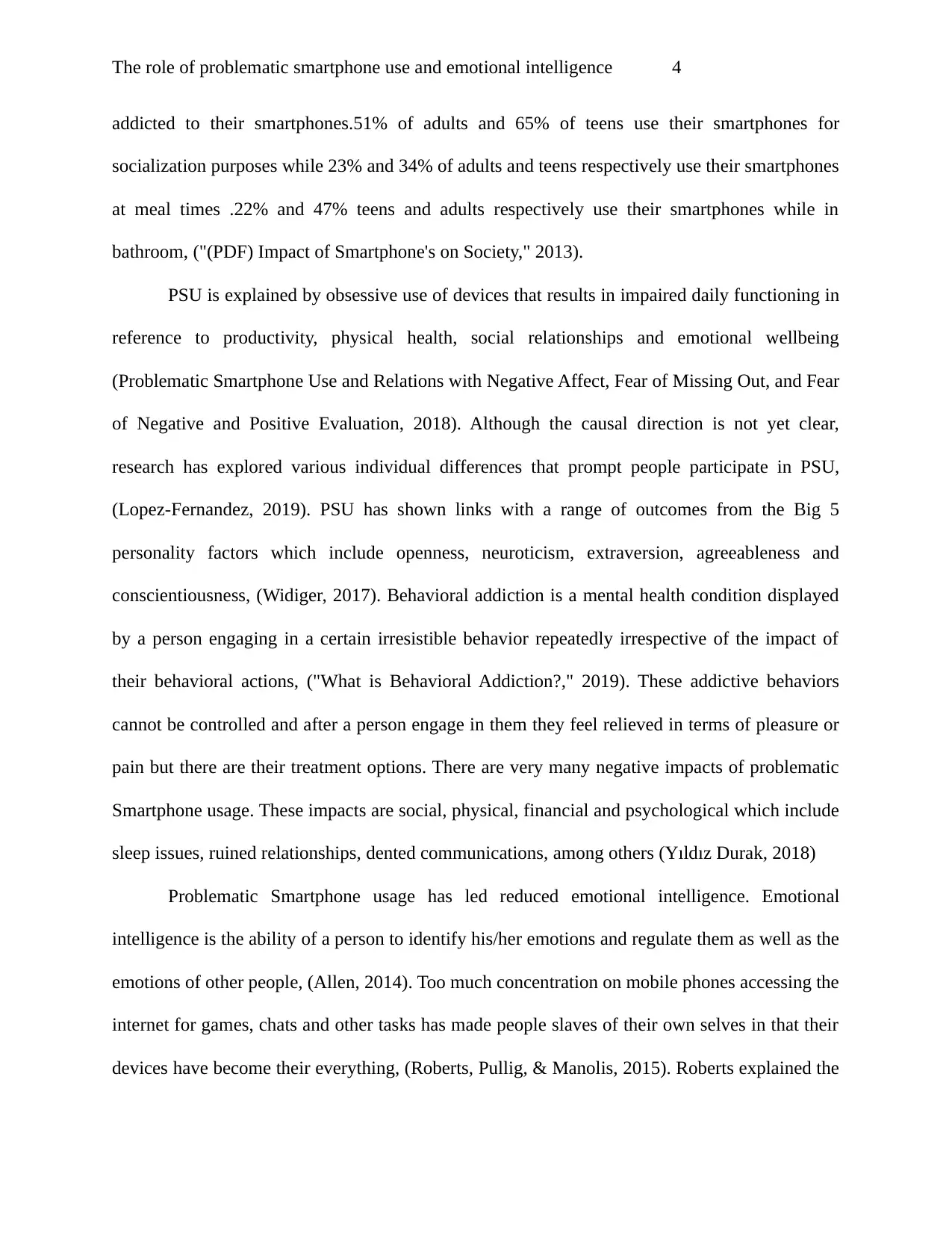
The role of problematic smartphone use and emotional intelligence 4
addicted to their smartphones.51% of adults and 65% of teens use their smartphones for
socialization purposes while 23% and 34% of adults and teens respectively use their smartphones
at meal times .22% and 47% teens and adults respectively use their smartphones while in
bathroom, ("(PDF) Impact of Smartphone's on Society," 2013).
PSU is explained by obsessive use of devices that results in impaired daily functioning in
reference to productivity, physical health, social relationships and emotional wellbeing
(Problematic Smartphone Use and Relations with Negative Affect, Fear of Missing Out, and Fear
of Negative and Positive Evaluation, 2018). Although the causal direction is not yet clear,
research has explored various individual differences that prompt people participate in PSU,
(Lopez-Fernandez, 2019). PSU has shown links with a range of outcomes from the Big 5
personality factors which include openness, neuroticism, extraversion, agreeableness and
conscientiousness, (Widiger, 2017). Behavioral addiction is a mental health condition displayed
by a person engaging in a certain irresistible behavior repeatedly irrespective of the impact of
their behavioral actions, ("What is Behavioral Addiction?," 2019). These addictive behaviors
cannot be controlled and after a person engage in them they feel relieved in terms of pleasure or
pain but there are their treatment options. There are very many negative impacts of problematic
Smartphone usage. These impacts are social, physical, financial and psychological which include
sleep issues, ruined relationships, dented communications, among others (Yıldız Durak, 2018)
Problematic Smartphone usage has led reduced emotional intelligence. Emotional
intelligence is the ability of a person to identify his/her emotions and regulate them as well as the
emotions of other people, (Allen, 2014). Too much concentration on mobile phones accessing the
internet for games, chats and other tasks has made people slaves of their own selves in that their
devices have become their everything, (Roberts, Pullig, & Manolis, 2015). Roberts explained the
addicted to their smartphones.51% of adults and 65% of teens use their smartphones for
socialization purposes while 23% and 34% of adults and teens respectively use their smartphones
at meal times .22% and 47% teens and adults respectively use their smartphones while in
bathroom, ("(PDF) Impact of Smartphone's on Society," 2013).
PSU is explained by obsessive use of devices that results in impaired daily functioning in
reference to productivity, physical health, social relationships and emotional wellbeing
(Problematic Smartphone Use and Relations with Negative Affect, Fear of Missing Out, and Fear
of Negative and Positive Evaluation, 2018). Although the causal direction is not yet clear,
research has explored various individual differences that prompt people participate in PSU,
(Lopez-Fernandez, 2019). PSU has shown links with a range of outcomes from the Big 5
personality factors which include openness, neuroticism, extraversion, agreeableness and
conscientiousness, (Widiger, 2017). Behavioral addiction is a mental health condition displayed
by a person engaging in a certain irresistible behavior repeatedly irrespective of the impact of
their behavioral actions, ("What is Behavioral Addiction?," 2019). These addictive behaviors
cannot be controlled and after a person engage in them they feel relieved in terms of pleasure or
pain but there are their treatment options. There are very many negative impacts of problematic
Smartphone usage. These impacts are social, physical, financial and psychological which include
sleep issues, ruined relationships, dented communications, among others (Yıldız Durak, 2018)
Problematic Smartphone usage has led reduced emotional intelligence. Emotional
intelligence is the ability of a person to identify his/her emotions and regulate them as well as the
emotions of other people, (Allen, 2014). Too much concentration on mobile phones accessing the
internet for games, chats and other tasks has made people slaves of their own selves in that their
devices have become their everything, (Roberts, Pullig, & Manolis, 2015). Roberts explained the
Paraphrase This Document
Need a fresh take? Get an instant paraphrase of this document with our AI Paraphraser
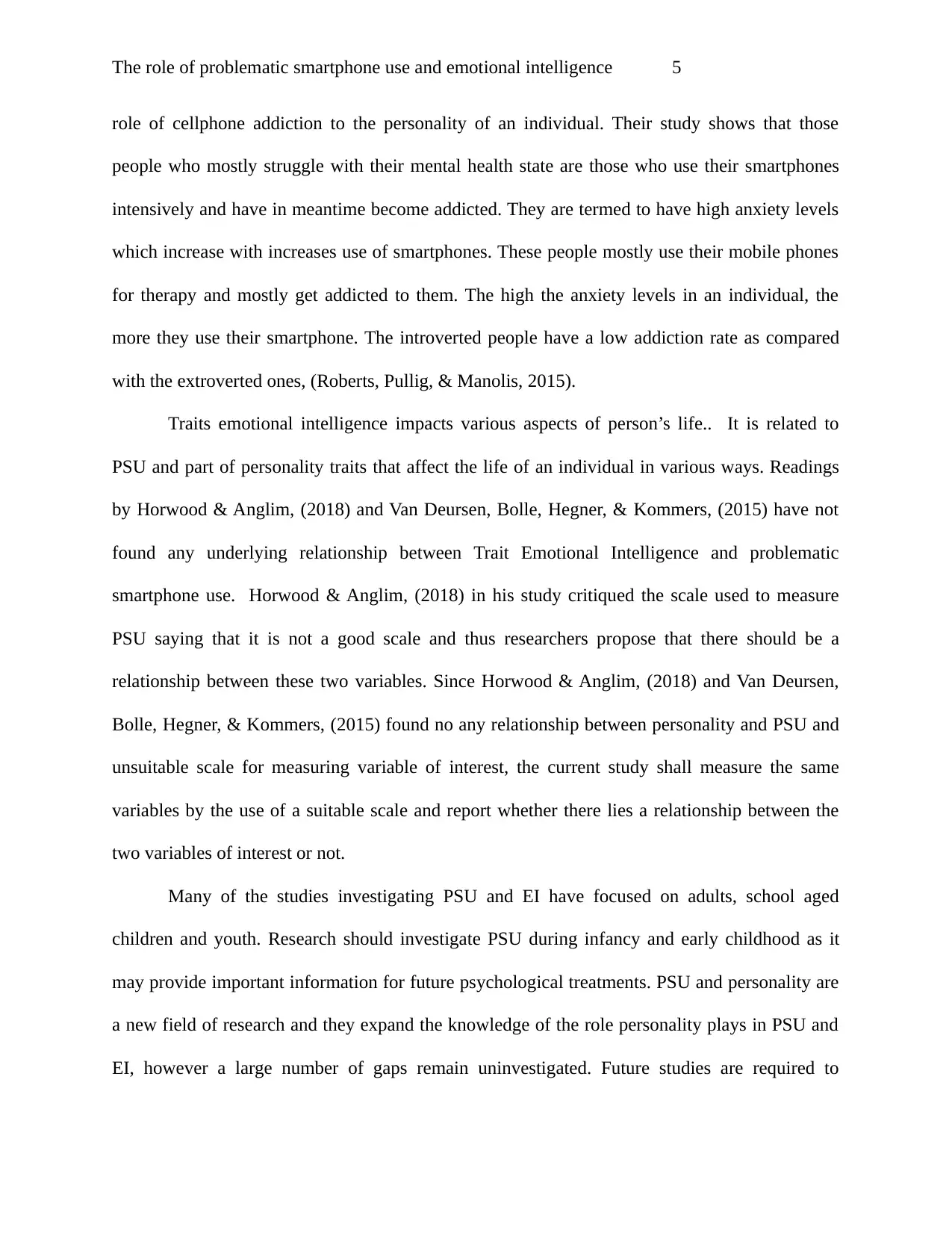
The role of problematic smartphone use and emotional intelligence 5
role of cellphone addiction to the personality of an individual. Their study shows that those
people who mostly struggle with their mental health state are those who use their smartphones
intensively and have in meantime become addicted. They are termed to have high anxiety levels
which increase with increases use of smartphones. These people mostly use their mobile phones
for therapy and mostly get addicted to them. The high the anxiety levels in an individual, the
more they use their smartphone. The introverted people have a low addiction rate as compared
with the extroverted ones, (Roberts, Pullig, & Manolis, 2015).
Traits emotional intelligence impacts various aspects of person’s life.. It is related to
PSU and part of personality traits that affect the life of an individual in various ways. Readings
by Horwood & Anglim, (2018) and Van Deursen, Bolle, Hegner, & Kommers, (2015) have not
found any underlying relationship between Trait Emotional Intelligence and problematic
smartphone use. Horwood & Anglim, (2018) in his study critiqued the scale used to measure
PSU saying that it is not a good scale and thus researchers propose that there should be a
relationship between these two variables. Since Horwood & Anglim, (2018) and Van Deursen,
Bolle, Hegner, & Kommers, (2015) found no any relationship between personality and PSU and
unsuitable scale for measuring variable of interest, the current study shall measure the same
variables by the use of a suitable scale and report whether there lies a relationship between the
two variables of interest or not.
Many of the studies investigating PSU and EI have focused on adults, school aged
children and youth. Research should investigate PSU during infancy and early childhood as it
may provide important information for future psychological treatments. PSU and personality are
a new field of research and they expand the knowledge of the role personality plays in PSU and
EI, however a large number of gaps remain uninvestigated. Future studies are required to
role of cellphone addiction to the personality of an individual. Their study shows that those
people who mostly struggle with their mental health state are those who use their smartphones
intensively and have in meantime become addicted. They are termed to have high anxiety levels
which increase with increases use of smartphones. These people mostly use their mobile phones
for therapy and mostly get addicted to them. The high the anxiety levels in an individual, the
more they use their smartphone. The introverted people have a low addiction rate as compared
with the extroverted ones, (Roberts, Pullig, & Manolis, 2015).
Traits emotional intelligence impacts various aspects of person’s life.. It is related to
PSU and part of personality traits that affect the life of an individual in various ways. Readings
by Horwood & Anglim, (2018) and Van Deursen, Bolle, Hegner, & Kommers, (2015) have not
found any underlying relationship between Trait Emotional Intelligence and problematic
smartphone use. Horwood & Anglim, (2018) in his study critiqued the scale used to measure
PSU saying that it is not a good scale and thus researchers propose that there should be a
relationship between these two variables. Since Horwood & Anglim, (2018) and Van Deursen,
Bolle, Hegner, & Kommers, (2015) found no any relationship between personality and PSU and
unsuitable scale for measuring variable of interest, the current study shall measure the same
variables by the use of a suitable scale and report whether there lies a relationship between the
two variables of interest or not.
Many of the studies investigating PSU and EI have focused on adults, school aged
children and youth. Research should investigate PSU during infancy and early childhood as it
may provide important information for future psychological treatments. PSU and personality are
a new field of research and they expand the knowledge of the role personality plays in PSU and
EI, however a large number of gaps remain uninvestigated. Future studies are required to
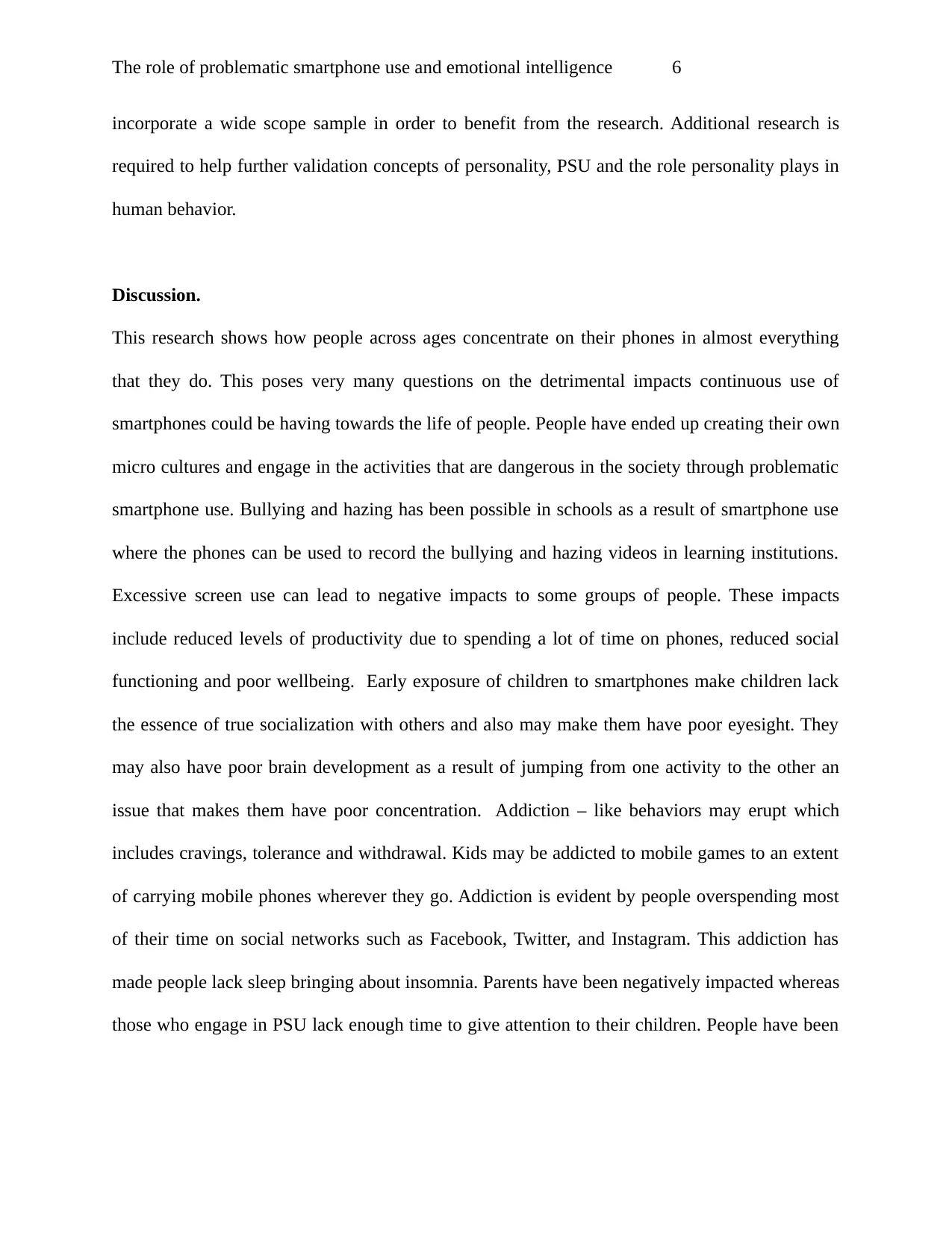
The role of problematic smartphone use and emotional intelligence 6
incorporate a wide scope sample in order to benefit from the research. Additional research is
required to help further validation concepts of personality, PSU and the role personality plays in
human behavior.
Discussion.
This research shows how people across ages concentrate on their phones in almost everything
that they do. This poses very many questions on the detrimental impacts continuous use of
smartphones could be having towards the life of people. People have ended up creating their own
micro cultures and engage in the activities that are dangerous in the society through problematic
smartphone use. Bullying and hazing has been possible in schools as a result of smartphone use
where the phones can be used to record the bullying and hazing videos in learning institutions.
Excessive screen use can lead to negative impacts to some groups of people. These impacts
include reduced levels of productivity due to spending a lot of time on phones, reduced social
functioning and poor wellbeing. Early exposure of children to smartphones make children lack
the essence of true socialization with others and also may make them have poor eyesight. They
may also have poor brain development as a result of jumping from one activity to the other an
issue that makes them have poor concentration. Addiction – like behaviors may erupt which
includes cravings, tolerance and withdrawal. Kids may be addicted to mobile games to an extent
of carrying mobile phones wherever they go. Addiction is evident by people overspending most
of their time on social networks such as Facebook, Twitter, and Instagram. This addiction has
made people lack sleep bringing about insomnia. Parents have been negatively impacted whereas
those who engage in PSU lack enough time to give attention to their children. People have been
incorporate a wide scope sample in order to benefit from the research. Additional research is
required to help further validation concepts of personality, PSU and the role personality plays in
human behavior.
Discussion.
This research shows how people across ages concentrate on their phones in almost everything
that they do. This poses very many questions on the detrimental impacts continuous use of
smartphones could be having towards the life of people. People have ended up creating their own
micro cultures and engage in the activities that are dangerous in the society through problematic
smartphone use. Bullying and hazing has been possible in schools as a result of smartphone use
where the phones can be used to record the bullying and hazing videos in learning institutions.
Excessive screen use can lead to negative impacts to some groups of people. These impacts
include reduced levels of productivity due to spending a lot of time on phones, reduced social
functioning and poor wellbeing. Early exposure of children to smartphones make children lack
the essence of true socialization with others and also may make them have poor eyesight. They
may also have poor brain development as a result of jumping from one activity to the other an
issue that makes them have poor concentration. Addiction – like behaviors may erupt which
includes cravings, tolerance and withdrawal. Kids may be addicted to mobile games to an extent
of carrying mobile phones wherever they go. Addiction is evident by people overspending most
of their time on social networks such as Facebook, Twitter, and Instagram. This addiction has
made people lack sleep bringing about insomnia. Parents have been negatively impacted whereas
those who engage in PSU lack enough time to give attention to their children. People have been
⊘ This is a preview!⊘
Do you want full access?
Subscribe today to unlock all pages.

Trusted by 1+ million students worldwide
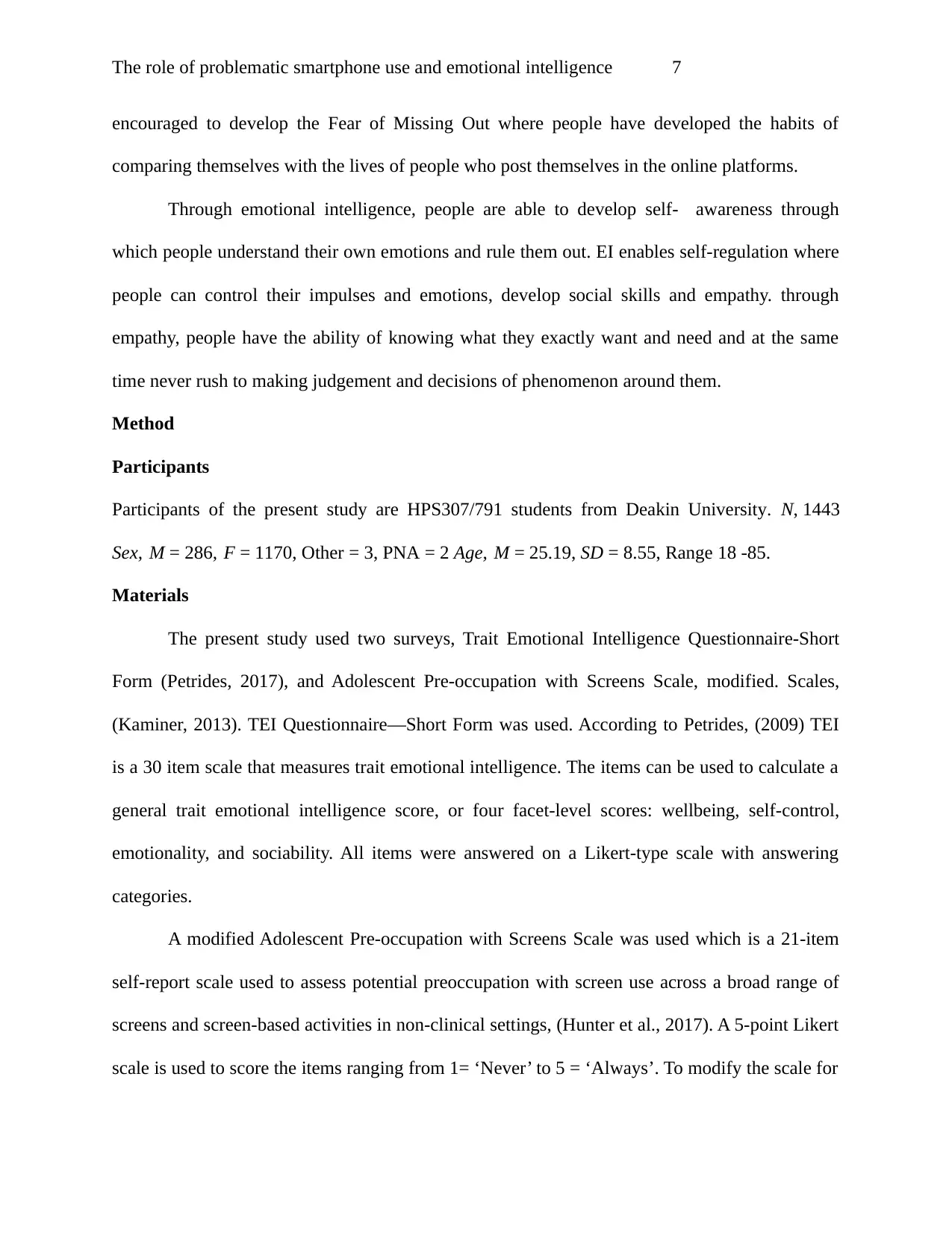
The role of problematic smartphone use and emotional intelligence 7
encouraged to develop the Fear of Missing Out where people have developed the habits of
comparing themselves with the lives of people who post themselves in the online platforms.
Through emotional intelligence, people are able to develop self- awareness through
which people understand their own emotions and rule them out. EI enables self-regulation where
people can control their impulses and emotions, develop social skills and empathy. through
empathy, people have the ability of knowing what they exactly want and need and at the same
time never rush to making judgement and decisions of phenomenon around them.
Method
Participants
Participants of the present study are HPS307/791 students from Deakin University. N, 1443
Sex, M = 286, F = 1170, Other = 3, PNA = 2 Age, M = 25.19, SD = 8.55, Range 18 ‐85.
Materials
The present study used two surveys, Trait Emotional Intelligence Questionnaire-Short
Form (Petrides, 2017), and Adolescent Pre-occupation with Screens Scale, modified. Scales,
(Kaminer, 2013). TEI Questionnaire—Short Form was used. According to Petrides, (2009) TEI
is a 30 item scale that measures trait emotional intelligence. The items can be used to calculate a
general trait emotional intelligence score, or four facet-level scores: wellbeing, self-control,
emotionality, and sociability. All items were answered on a Likert-type scale with answering
categories.
A modified Adolescent Pre-occupation with Screens Scale was used which is a 21-item
self-report scale used to assess potential preoccupation with screen use across a broad range of
screens and screen-based activities in non-clinical settings, (Hunter et al., 2017). A 5-point Likert
scale is used to score the items ranging from 1= ‘Never’ to 5 = ‘Always’. To modify the scale for
encouraged to develop the Fear of Missing Out where people have developed the habits of
comparing themselves with the lives of people who post themselves in the online platforms.
Through emotional intelligence, people are able to develop self- awareness through
which people understand their own emotions and rule them out. EI enables self-regulation where
people can control their impulses and emotions, develop social skills and empathy. through
empathy, people have the ability of knowing what they exactly want and need and at the same
time never rush to making judgement and decisions of phenomenon around them.
Method
Participants
Participants of the present study are HPS307/791 students from Deakin University. N, 1443
Sex, M = 286, F = 1170, Other = 3, PNA = 2 Age, M = 25.19, SD = 8.55, Range 18 ‐85.
Materials
The present study used two surveys, Trait Emotional Intelligence Questionnaire-Short
Form (Petrides, 2017), and Adolescent Pre-occupation with Screens Scale, modified. Scales,
(Kaminer, 2013). TEI Questionnaire—Short Form was used. According to Petrides, (2009) TEI
is a 30 item scale that measures trait emotional intelligence. The items can be used to calculate a
general trait emotional intelligence score, or four facet-level scores: wellbeing, self-control,
emotionality, and sociability. All items were answered on a Likert-type scale with answering
categories.
A modified Adolescent Pre-occupation with Screens Scale was used which is a 21-item
self-report scale used to assess potential preoccupation with screen use across a broad range of
screens and screen-based activities in non-clinical settings, (Hunter et al., 2017). A 5-point Likert
scale is used to score the items ranging from 1= ‘Never’ to 5 = ‘Always’. To modify the scale for
Paraphrase This Document
Need a fresh take? Get an instant paraphrase of this document with our AI Paraphraser
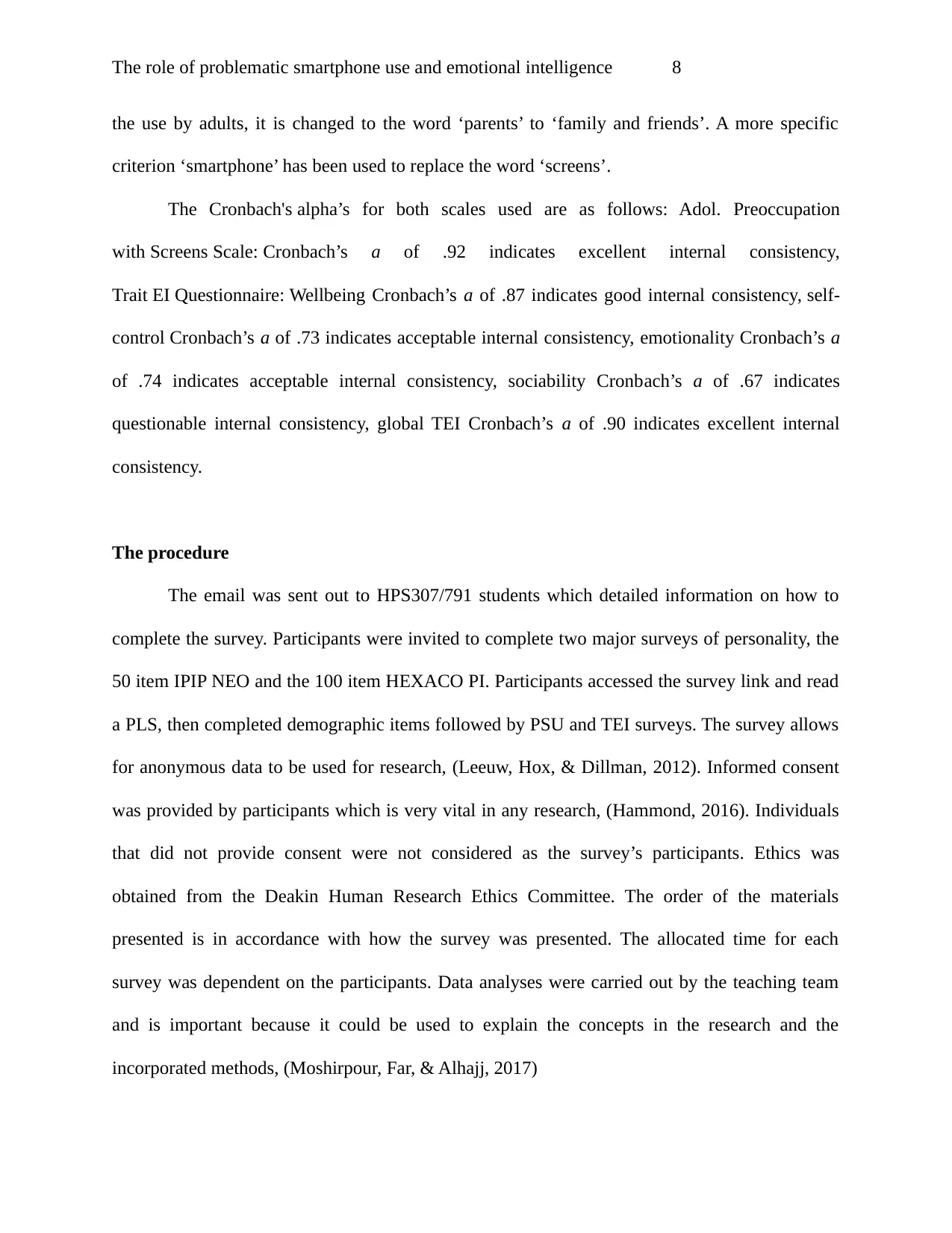
The role of problematic smartphone use and emotional intelligence 8
the use by adults, it is changed to the word ‘parents’ to ‘family and friends’. A more specific
criterion ‘smartphone’ has been used to replace the word ‘screens’.
The Cronbach's alpha’s for both scales used are as follows: Adol. Preoccupation
with Screens Scale: Cronbach’s a of .92 indicates excellent internal consistency,
Trait EI Questionnaire: Wellbeing Cronbach’s a of .87 indicates good internal consistency, self‐
control Cronbach’s a of .73 indicates acceptable internal consistency, emotionality Cronbach’s a
of .74 indicates acceptable internal consistency, sociability Cronbach’s a of .67 indicates
questionable internal consistency, global TEI Cronbach’s a of .90 indicates excellent internal
consistency.
The procedure
The email was sent out to HPS307/791 students which detailed information on how to
complete the survey. Participants were invited to complete two major surveys of personality, the
50 item IPIP NEO and the 100 item HEXACO PI. Participants accessed the survey link and read
a PLS, then completed demographic items followed by PSU and TEI surveys. The survey allows
for anonymous data to be used for research, (Leeuw, Hox, & Dillman, 2012). Informed consent
was provided by participants which is very vital in any research, (Hammond, 2016). Individuals
that did not provide consent were not considered as the survey’s participants. Ethics was
obtained from the Deakin Human Research Ethics Committee. The order of the materials
presented is in accordance with how the survey was presented. The allocated time for each
survey was dependent on the participants. Data analyses were carried out by the teaching team
and is important because it could be used to explain the concepts in the research and the
incorporated methods, (Moshirpour, Far, & Alhajj, 2017)
the use by adults, it is changed to the word ‘parents’ to ‘family and friends’. A more specific
criterion ‘smartphone’ has been used to replace the word ‘screens’.
The Cronbach's alpha’s for both scales used are as follows: Adol. Preoccupation
with Screens Scale: Cronbach’s a of .92 indicates excellent internal consistency,
Trait EI Questionnaire: Wellbeing Cronbach’s a of .87 indicates good internal consistency, self‐
control Cronbach’s a of .73 indicates acceptable internal consistency, emotionality Cronbach’s a
of .74 indicates acceptable internal consistency, sociability Cronbach’s a of .67 indicates
questionable internal consistency, global TEI Cronbach’s a of .90 indicates excellent internal
consistency.
The procedure
The email was sent out to HPS307/791 students which detailed information on how to
complete the survey. Participants were invited to complete two major surveys of personality, the
50 item IPIP NEO and the 100 item HEXACO PI. Participants accessed the survey link and read
a PLS, then completed demographic items followed by PSU and TEI surveys. The survey allows
for anonymous data to be used for research, (Leeuw, Hox, & Dillman, 2012). Informed consent
was provided by participants which is very vital in any research, (Hammond, 2016). Individuals
that did not provide consent were not considered as the survey’s participants. Ethics was
obtained from the Deakin Human Research Ethics Committee. The order of the materials
presented is in accordance with how the survey was presented. The allocated time for each
survey was dependent on the participants. Data analyses were carried out by the teaching team
and is important because it could be used to explain the concepts in the research and the
incorporated methods, (Moshirpour, Far, & Alhajj, 2017)
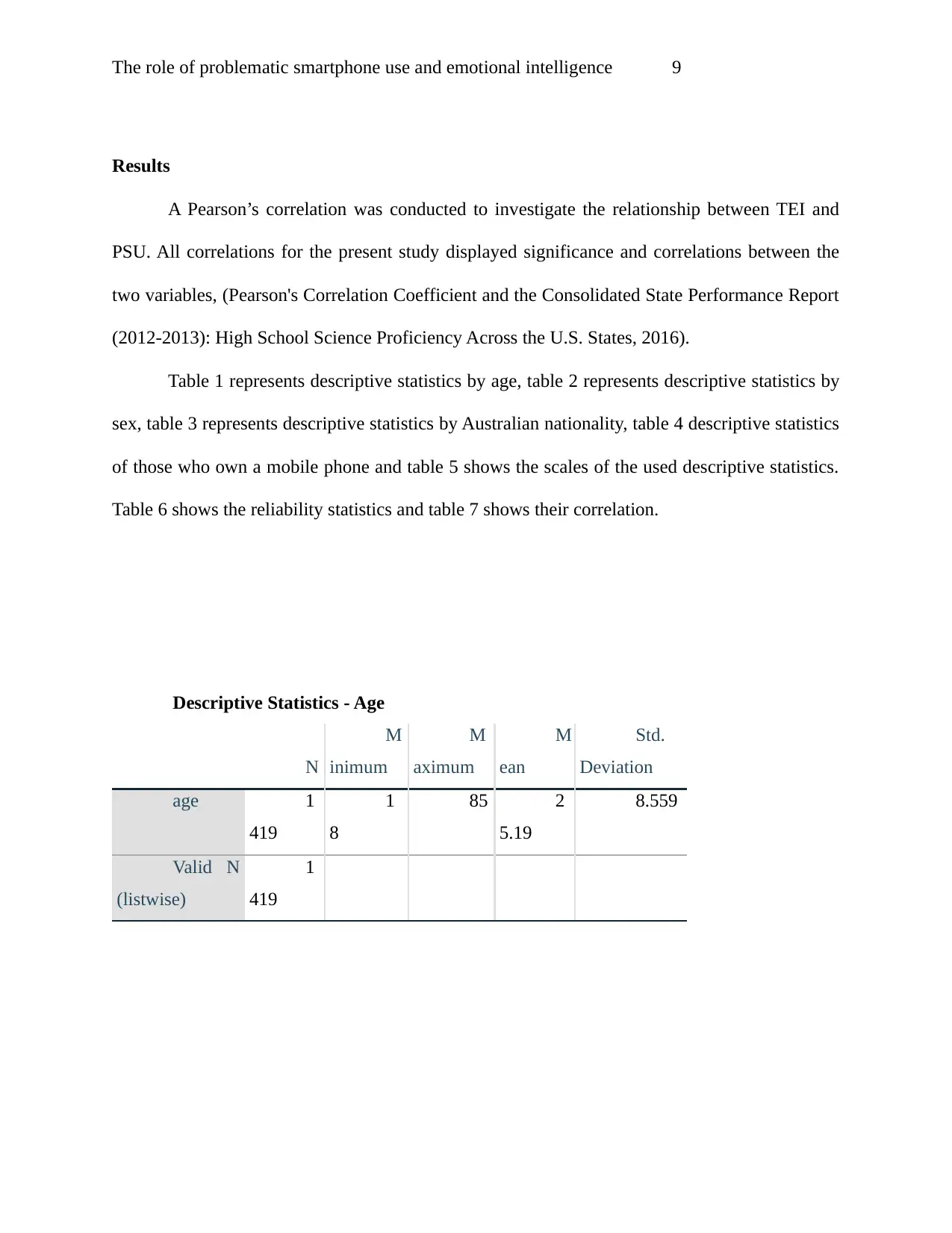
The role of problematic smartphone use and emotional intelligence 9
Results
A Pearson’s correlation was conducted to investigate the relationship between TEI and
PSU. All correlations for the present study displayed significance and correlations between the
two variables, (Pearson's Correlation Coefficient and the Consolidated State Performance Report
(2012-2013): High School Science Proficiency Across the U.S. States, 2016).
Table 1 represents descriptive statistics by age, table 2 represents descriptive statistics by
sex, table 3 represents descriptive statistics by Australian nationality, table 4 descriptive statistics
of those who own a mobile phone and table 5 shows the scales of the used descriptive statistics.
Table 6 shows the reliability statistics and table 7 shows their correlation.
Descriptive Statistics - Age
N
M
inimum
M
aximum
M
ean
Std.
Deviation
age 1
419
1
8
85 2
5.19
8.559
Valid N
(listwise)
1
419
Results
A Pearson’s correlation was conducted to investigate the relationship between TEI and
PSU. All correlations for the present study displayed significance and correlations between the
two variables, (Pearson's Correlation Coefficient and the Consolidated State Performance Report
(2012-2013): High School Science Proficiency Across the U.S. States, 2016).
Table 1 represents descriptive statistics by age, table 2 represents descriptive statistics by
sex, table 3 represents descriptive statistics by Australian nationality, table 4 descriptive statistics
of those who own a mobile phone and table 5 shows the scales of the used descriptive statistics.
Table 6 shows the reliability statistics and table 7 shows their correlation.
Descriptive Statistics - Age
N
M
inimum
M
aximum
M
ean
Std.
Deviation
age 1
419
1
8
85 2
5.19
8.559
Valid N
(listwise)
1
419
⊘ This is a preview!⊘
Do you want full access?
Subscribe today to unlock all pages.

Trusted by 1+ million students worldwide
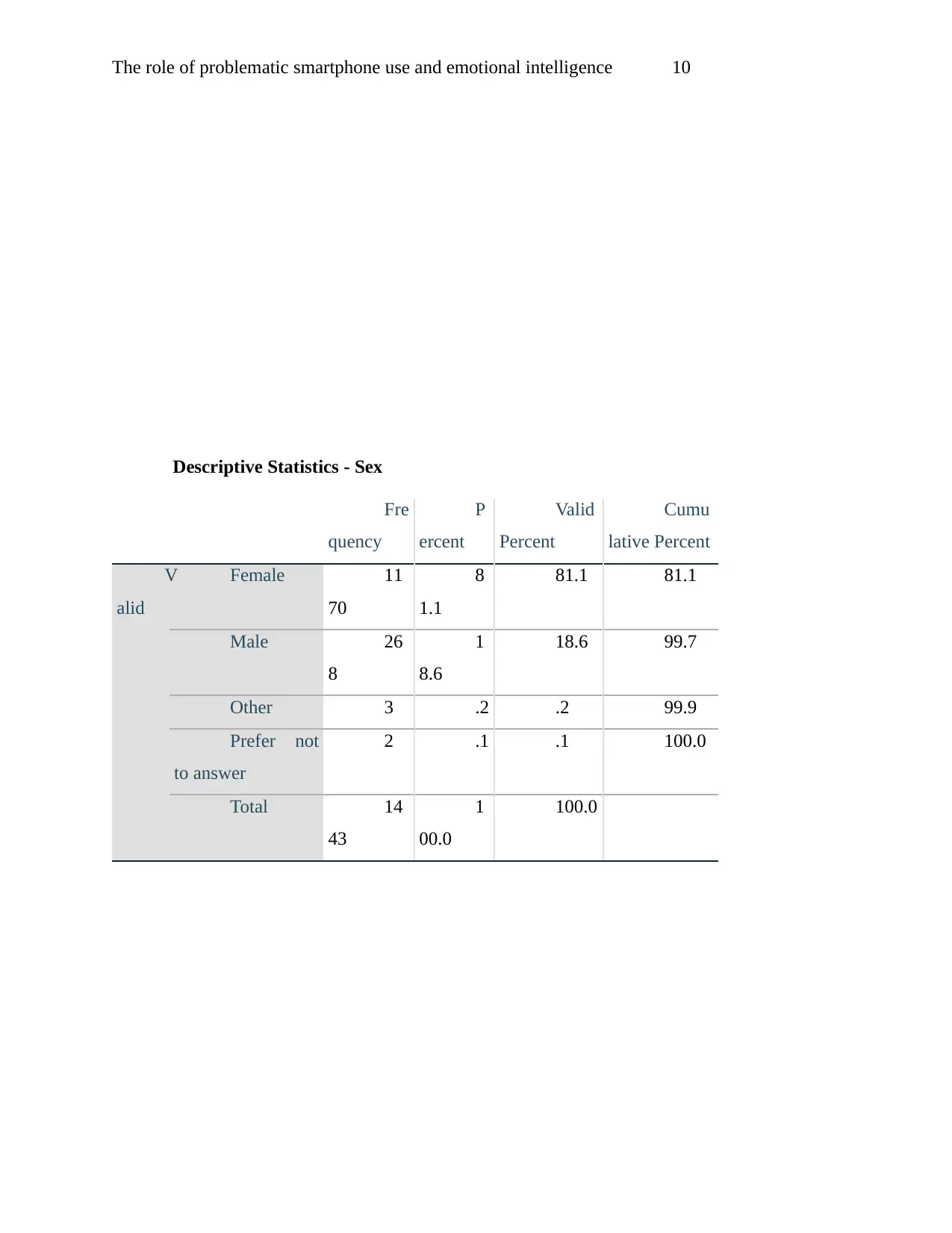
The role of problematic smartphone use and emotional intelligence 10
Descriptive Statistics - Sex
Fre
quency
P
ercent
Valid
Percent
Cumu
lative Percent
V
alid
Female 11
70
8
1.1
81.1 81.1
Male 26
8
1
8.6
18.6 99.7
Other 3 .2 .2 99.9
Prefer not
to answer
2 .1 .1 100.0
Total 14
43
1
00.0
100.0
Descriptive Statistics - Sex
Fre
quency
P
ercent
Valid
Percent
Cumu
lative Percent
V
alid
Female 11
70
8
1.1
81.1 81.1
Male 26
8
1
8.6
18.6 99.7
Other 3 .2 .2 99.9
Prefer not
to answer
2 .1 .1 100.0
Total 14
43
1
00.0
100.0
Paraphrase This Document
Need a fresh take? Get an instant paraphrase of this document with our AI Paraphraser
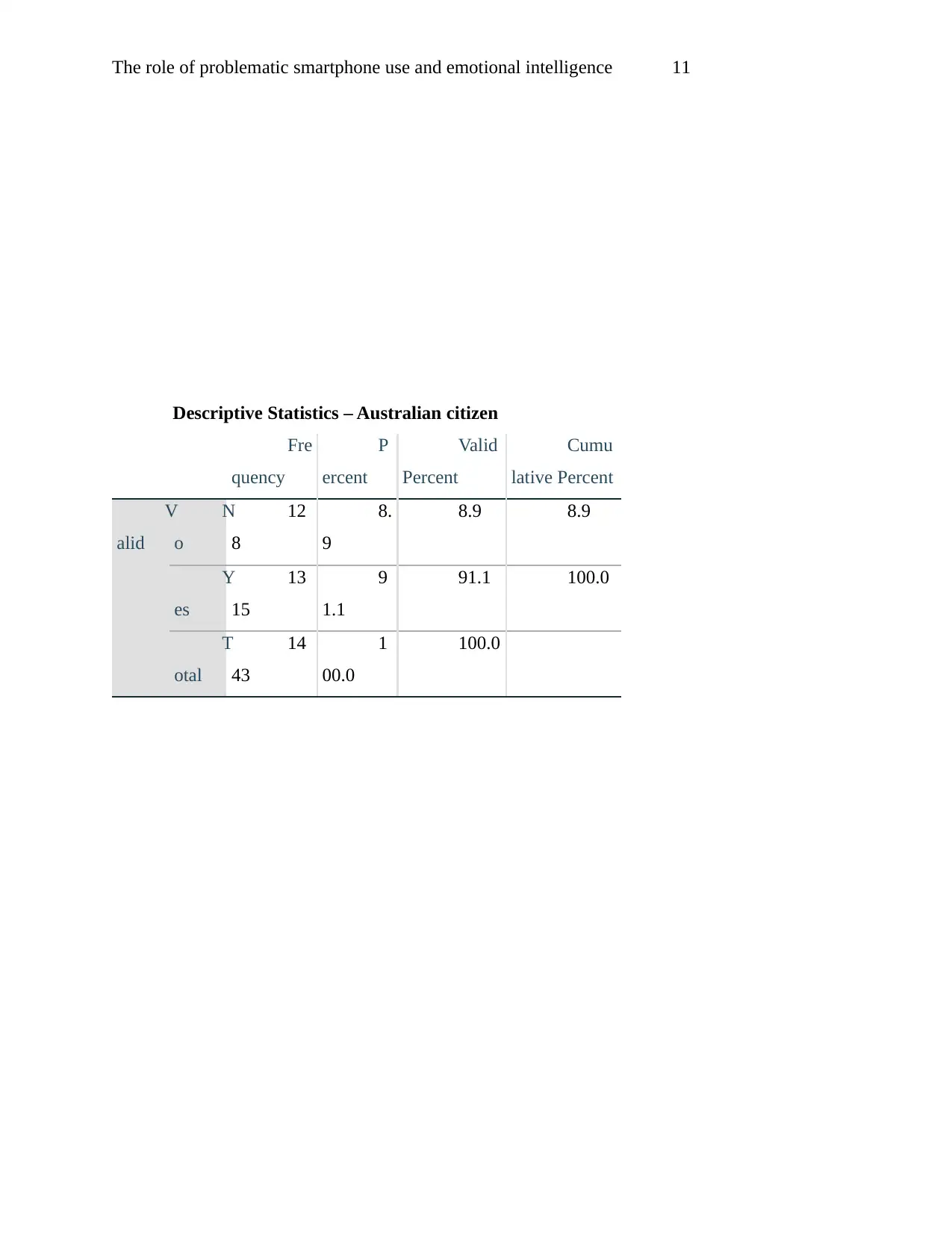
The role of problematic smartphone use and emotional intelligence 11
Descriptive Statistics – Australian citizen
Fre
quency
P
ercent
Valid
Percent
Cumu
lative Percent
V
alid
N
o
12
8
8.
9
8.9 8.9
Y
es
13
15
9
1.1
91.1 100.0
T
otal
14
43
1
00.0
100.0
Descriptive Statistics – Australian citizen
Fre
quency
P
ercent
Valid
Percent
Cumu
lative Percent
V
alid
N
o
12
8
8.
9
8.9 8.9
Y
es
13
15
9
1.1
91.1 100.0
T
otal
14
43
1
00.0
100.0
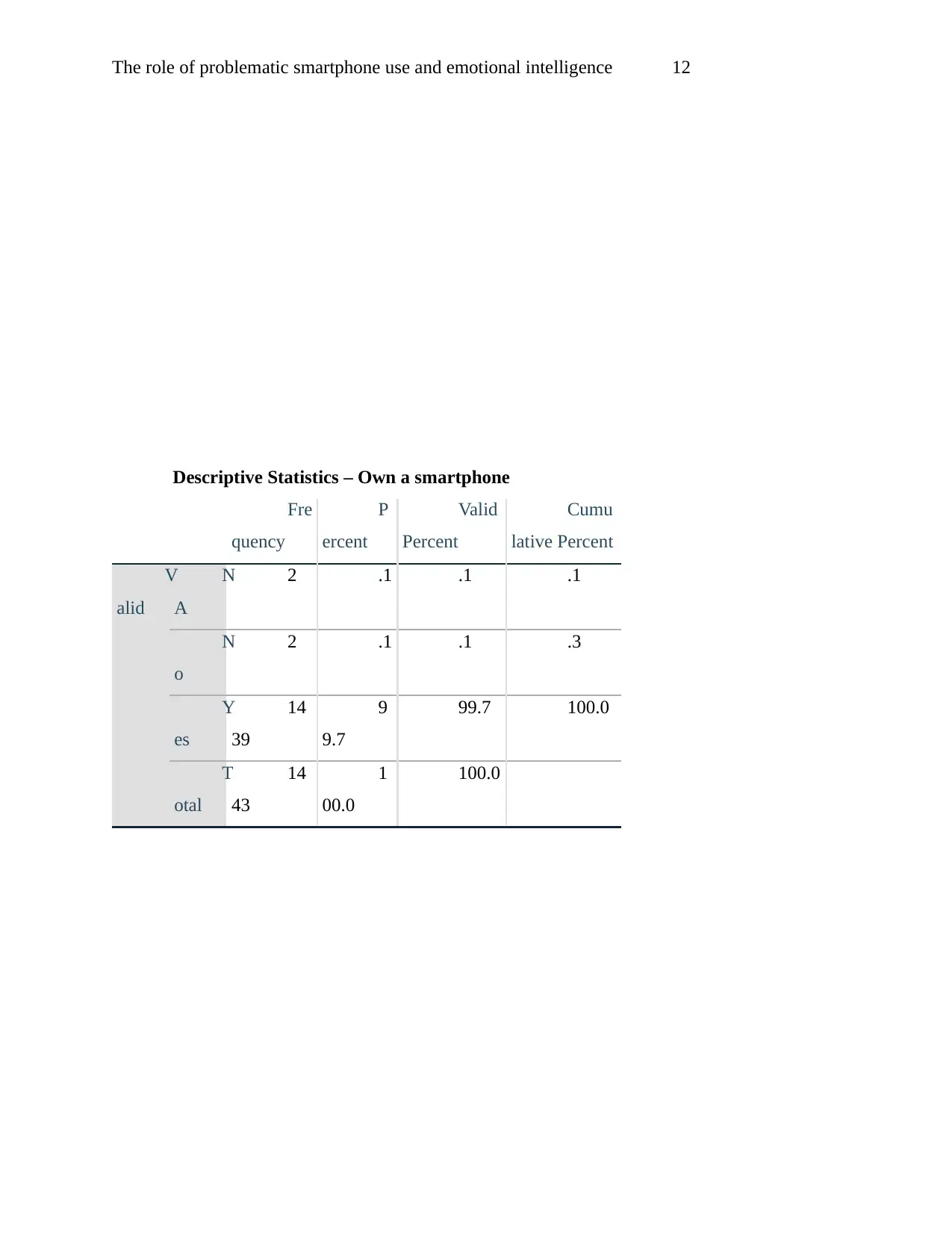
The role of problematic smartphone use and emotional intelligence 12
Descriptive Statistics – Own a smartphone
Fre
quency
P
ercent
Valid
Percent
Cumu
lative Percent
V
alid
N
A
2 .1 .1 .1
N
o
2 .1 .1 .3
Y
es
14
39
9
9.7
99.7 100.0
T
otal
14
43
1
00.0
100.0
Descriptive Statistics – Own a smartphone
Fre
quency
P
ercent
Valid
Percent
Cumu
lative Percent
V
alid
N
A
2 .1 .1 .1
N
o
2 .1 .1 .3
Y
es
14
39
9
9.7
99.7 100.0
T
otal
14
43
1
00.0
100.0
⊘ This is a preview!⊘
Do you want full access?
Subscribe today to unlock all pages.

Trusted by 1+ million students worldwide
1 out of 19
Your All-in-One AI-Powered Toolkit for Academic Success.
+13062052269
info@desklib.com
Available 24*7 on WhatsApp / Email
![[object Object]](/_next/static/media/star-bottom.7253800d.svg)
Unlock your academic potential
Copyright © 2020–2026 A2Z Services. All Rights Reserved. Developed and managed by ZUCOL.
